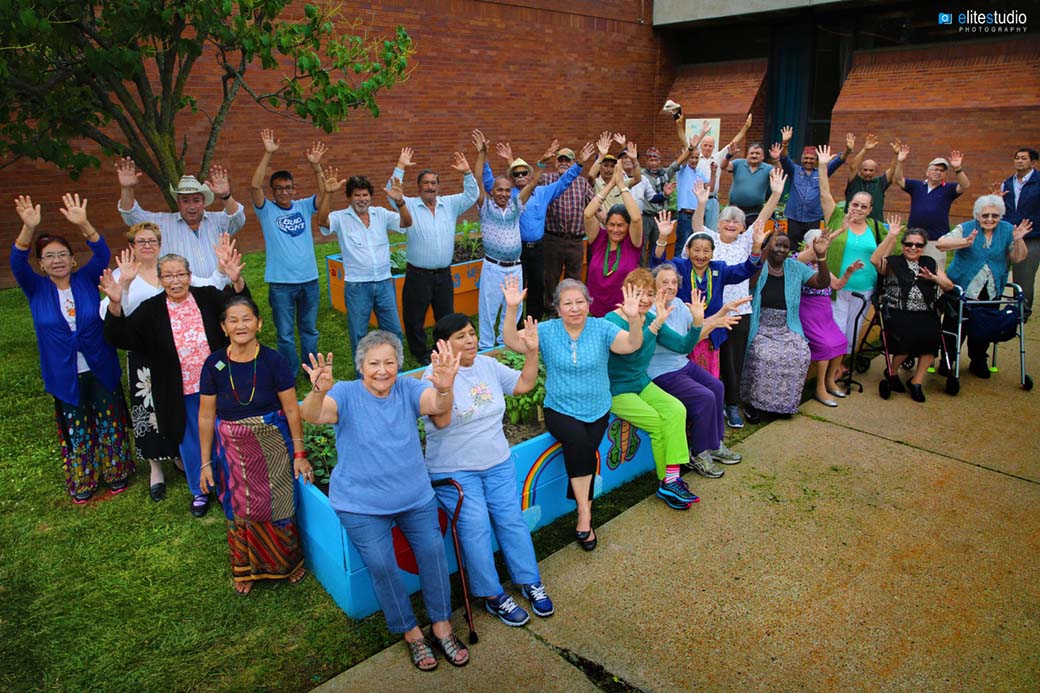[:en]
“As an organization we strive to improve the quality of life of seniors, both their physical and mental well-being. We do it through advocacy, education and access to social services,” said Carolina Padilla, Executive Director of the Intercultural Senior Center.
The ISC’s primary goal is to serve the underserved aging of our community. Padilla explained programs and services are for people age 50 and over.
There’s a lot more going on at the center than people might think.
“The mentality for many people is that seniors come to socialize, wait for a hot meal and then go home,” Padilla said.
The reality is that more than 400 seniors come in each week with about 60-90 per day.
And they’re doing a lot more than just eating.
The Intercultural Senior Center offers Tai Chai, salsa classes, sewing, gardening, folkloric dancing, music and arts. All of which give seniors fun opportunities to learn, move and socialize.
Padilla said there’s also a department of social services in the center that does case management.
“There is no fee to be part of the organization. Seniors simply go through an intake process to assess their needs, whether they are legal, medical, social or they simply want to be more physically active,” she said.
The ISC also provides English as a Second Language classes because the center primarily serves Latinos and refugees. But there are also Spanish classes for English speakers, citizenship courses and basic computer skills training.
Exercise is provided on a daily basis as well and there is caregiver assistance and a grandparents’ support group.
“We also have mental health support groups in four different languages and have a partnership with the VNA, so we have a nutritionist who comes every month,” Padilla said.
Nurses are on premises every week to take care of any other needs the seniors might have from trimming nails to diabetes checks. Padilla said these services are made possible with a partnership through Sarpy and Cass counties.
During the warmer months, ISC staff take seniors to see cultural events or take them on community visits to see the city.
“Some seniors come once a week for personal reasons but others are here Monday through Friday. They enjoy being active, learning and seeing their friends. And since they’re here every day, they give us valuable input about the things they want to change here or things they would like to have here,” she said.
95% of the people who go the center each day use the ISC’s transportation. And meals are given through the Meals on Wheels program from the Eastern Nebraska Office on Aging. Padilla said the food is brought in each day.
Though there is no charge to eat, the ISC always accepts contributions. And there’s also a monthly pantry where seniors can take a food item home to help them feel they are contributing to their family’s well-being.
“I think there’s a concept about senior centers that they’re boring or just for old people but getting old doesn’t mean you can’t be part of the community. People need to be engaged and avoid isolation. That’s what makes people sick,” said Padilla.
She said there aren’t many organizations like the Intercultural Senior Center that are taking care of seniors from different backgrounds. Padilla said the center is diverse and many different languages are spoken there.
With the aging population on the rise, not everyone has the capacity to pay for a place to go. But by going to the ISC, Padilla said they can build strong, healthy relationships and engage in a variety of activities.
The ISC is open from 8-5 Monday through Friday. Services are offered from 8 to 2 and all classes start at 9:30.
If someone wants to learn more, Padilla said they can just go by the center and staff will give them a tour and show them what they do.
She said the ISC’s biggest goal in the next couple years is to find a permanent home. Since the center opened in March 2009, they’ve moved four times.
Padilla said as they grow, they want to become a one-stop shop for seniors. There are plans to have a geriatric nurse practitioner located in the center and bring more services in for seniors as well.
In the meantime, Padilla said the center can always use donations and not just the cash kind. Anyone can donate food, time or crafts. She said if a business wants to contribute, especially toward transportation needs, they would appreciate that as well.
“We are here to serve our seniors. People should care for those they love. Seniors deserve to have a place where they can enjoy themselves too,” she said.
Intercultural Senior Center, Located at 30th and R in the back of the YMCA building on Q, InterculturalSeniorCenter.org
8
[:es]
“Como organización buscamos mejorar la calidad de vida de los adultos mayores, para su bienestar físico y mental. Lo hacemos a través de la defensa, educación y acceso a servicios sociales”, dijo Carolina Padilla, Directora Ejecutiva del Intercultural Senior Center (ISC).
La meta principal del ISC es servir a los adultos mayores desatendidos en nuestra comunidad. Padilla explico que los programas y servicios son para las personas de 50 o más años de edad.
Hay muchas más cosas que se llevan a cabo en el centro de las que conocen las personas.
“Muchas personas piensan que los adultos mayores vienen a socializar, esperar por un alimento caliente y luego se van a casa”, dijo Padilla.
La realidad es que más de 400 adultos mayores vienen cada semana, con alrededor de 60 a 90 por día.
Y hacen mucho más que solamente comer.
El Intercultural Senior Center ofrece Tai Chi, clases de salsa, costura, jardinería, baile folclórico, música y arte. Todo esto brinda a los adultos mayores divertidas oportunidades para aprender, moverse y socializar.
Padilla dijo que también hay un departamento de servicios sociales en el centro que realiza manejo de casos.
“No hay una cuota para ser parte de la organización. Los adultos mayores simplemente pasan por un proceso de admisión para valorar sus necesidades, sean legales, médicas, sociales o que simplemente quieren ser físicamente más activos”, nos comenta.
El ISC también proporciona clases de Inglés como Segundo idioma pues el centro sirve principalmente a latinos y refugiados. Pero también hay clases de español para quienes hablan inglés, cursos sobre ciudadanía y capacitación sobre habilidades básicas de cómputo.
El ejercicio se proporciona diariamente, además de que hay asistencia de cuidados y un grupo de soporte de abuelos.
“También tenemos grupos de soporte de salud mental en cuatro idiomas diferentes y tenemos una alianza con la VNA por lo que nos visita un nutriólogo cada mes”, explicó Padilla.
Hay enfermeras en el lugar cada semana para cubrir cualquier otra necesidad de los adultos mayores, desde cortar sus uñas hasta realizar revisiones de diabetes. Padilla dijo que estos servicios son posibles gracias a una alianza con los condados de Sarpy y Cass.
Durante los meses más cálidos, le personal del ISC lleva a los adultos mayores a eventos culturales o los llevan en visitas comunitarias para ver la ciudad.
“Algunos adultos mayores visitan una vez por semana por razones personales, pero otros están aquí de lunes a viernes. Disfrutan estar activos, aprender y ver a sus amigos. Y como están aquí todos los días, nos ofrecen valiosa retroalimentación sobre las cosas que quieren que cambiemos o las cosas que les gustaría tener aquí”, nos dijo.
El 95% de las personas que van cada día al centro usan el transporte del ISC. Y las comidas son proporcionadas a través del programa Meals on Wheels de Eastern Nebraska Office on Aging. Padilla dijo que la comida llega cada día.
Aunque no hay un cobro por la comida, el ISC siempre acepta contribuciones. Y también hay una despensa mensual desde donde los adultos mayores pueden llevar alimentos a casa para ayudarles a sentir que están contribuyendo al bienestar de su familia.
“Yo pienso que hay un concepto sobre los centros para adultos mayores de que son aburridos o que son solamente para los adultos más mayores, pero envejecer no significa que no puedan ser parte de la comunidad. Las personas necesitan participar y evitar estar aislados. Eso es lo que hace que se enferme la gente”, dijo Padilla.
Ella dijo que no hay muchas organizaciones como el Intercultural Senior Center que estén cuidando de los adultos mayores de diversas procedencias. Padilla dijo que el centro es diverso y se hablan muchos lenguajes ahí.
Con el envejecimiento de la población en aumento, no todos tienen la capacidad de pagar por un lugar a donde ir. Pero al ir al ISC, Padilla dijo que pueden construir relaciones fuertes y saludables y participar en una gran variedad de actividades.
El ISC está abierto de 8 a.m. a 5 p.m. de lunes a viernes. Los servicios se ofrecen de 8 a.m. a 2 p.m. y las clases comienzan a las 9:30 a.m.
Si alguien quiere conocer más, Padilla dijo que pueden pasar por el centro y el personal les dará un tour y les mostrará lo que hacen.
Ella dijo que la más grande meta del ISC para los próximos años es en contra un hogar permanente. Desde que el centro abrió sus puertas en marzo de 2009 se han mudado cuatro veces.
Padilla dijo que al ir creciendo quieren convertirse en el único lugar que tengan que visitar los adultos mayores. Hay planes para tener una enfermera geriátrica ubicada en el centro y proporcionar más servicios a los adultos mayores.
Mientras tanto, Padilla dijo que el centro siempre puede aprovechar las donaciones presentadas, y no solamente aquellas en efectivo. Todos pueden donar alimentos, tiempo o manualidades. Ella dijo que si un negocio quiere contribuir, en especial para las necesidades de transporte, en verdad lo apreciarían.
“Estamos aquí para servir a los adultos mayores. Las personas deben cuidar a quienes aman. Los adultos mayores merecen tener un lugar en donde puedan disfrutar su vida”, comenta.
Intercultural Senior Center, ubicado en 30th y R en la parte posterior del edificio YMCA en la Q, InterculturalSeniorCenter.org
[:]




